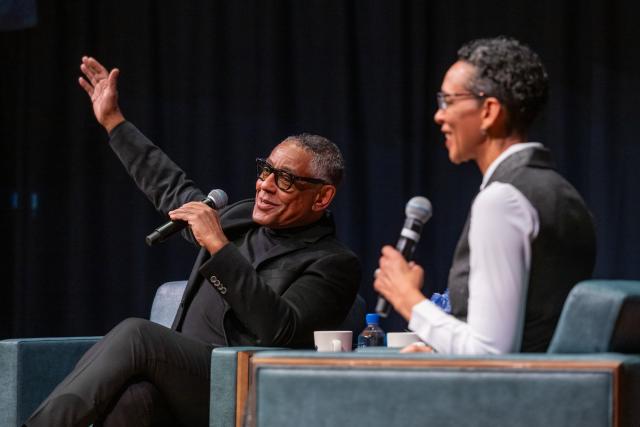By: Caroline Pease I Published: March 26, 2025
On March 4, Kean welcomed Breaking Bad legend Giancarlo Esposito as the President’s Distinguished Lecture Series featured speaker. Along with a thought-provoking discussion moderated by First Lady Darlene Repollet, Esposito led an intimate Q&A with Kean’s Theater Conservatory students. Esposito explored not only his career journey from Broadway to Hollywood, but also the transformative role of self-awareness in his craft. He spoke about the importance of focusing on one’s personal growth and the challenges he faced as a biracial actor in an industry often bound by stereotypes.
In his conversation with theater conservatory students, Esposito shared industry insight, referring to his superpower as the “ability to focus,” which allowed him to remain driven despite setbacks. He credits his success to his devotion to valuing himself.

“You have a value, and you are original, even if you don’t completely realize what your value is, you grow to understand and realize it by cultivating what your interests are and starting to value yourself in a higher way,” said Esposito.
The lecture explored his journey from his early Broadway days to becoming one of Hollywood’s most respected talents. He shed light on his experience as a biracial artist in the entertainment industry that involved defying stereotypical depictions.
“I wasn’t accepted because I didn’t want to fit in, I didn’t know how to fit in… ” said Esposito.
Esposito also shared how he transcended beyond acting and becoming a director. His interest in cameras originally piqued from filming Iona University’s men’s basketball games in the late ’70s, and later opened his own production, Quiet Hand Productions, in 2007.
“I wanted to know how to operate a camera, I got a taste of that, I put that in my toolkit. And years later, of course, I started to direct. And [directing] was cultivated by asking questions,” said Esposito.
Esposito intends to create “conscious content” with his films. His 2008 film Gospel Hill won over nine awards at several acclaimed film festivals.

Esposito’s approach to acting also extended to his collaboration with Breaking Bad director Vince Gilligan. He worked closely with Gilligan to ensure his portrayal of Gustavo Fring was not just another stereotype but a complex, multi-layered character. “I didn’t want to be the bad guy of the week. A stereotype.” Esposito shared, “I wanted to create something different that people would see in a new way.” This mindset of authenticity and depth in character development is a recurring theme in Esposito’s career.
Through his career, Esposito came to see acting as a way of healing his personality and trauma.
“I was told by an acting teacher many years ago that acting is a way of healing your personality, and I never forgot it…the more I denied myself and lost myself in characters and didn’t take my own temperature…the more I felt unfilled when I wasn’t acting, my life wasn’t complete,” said Esposito.
“Take your temperature” is a phrase Esposito frequently uses to remind him to check in with his thoughts, body, and spirit.
“I could only love myself when I was on stage and didn’t understand or know how to love myself because I hadn’t investigated myself enough. So wellness is really important,” said Esposito.
When the actor began to prioritize his mental health, his acting flourished.

“I started to heal my personality by looking at me outside of the roles I’m playing, which allowed me to play my roles on a deeper level and be an even better actor.”
Through his own reflection and mindset, Esposito was able to assess how trauma infiltrated his work and created self-restricting barriers. However, challenging his own notions of doubt allowed him to become the most self-assured version of himself.
“But I realized that I was suffering from trauma…I kept [it] inside me and came to America and felt I like I was being racially profiled…and I created the ‘they’… Now, I realize the part of that ‘they’ was the creation of the ‘they’ that I created inside of me. An expectation… that I wasn’t going to make it…And one day I said, ‘there are no theys, you are the devil,’” said Esposito.
Esposito closed his discussion with many valuable anecdotes, but one particularly regarding his advice on pursuing one’s ambitions:
“If you have a dream, it’s not tomorrow you realize the dream, it’s right now. In every moment that you live so you could attract that dream. But you have to do something to get something…you need to know what you want to be.”

You must be logged in to post a comment.